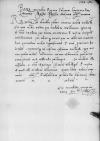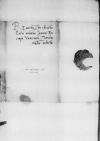Letter #3340
Bona Sforza to Ioannes DANTISCUSPiotrków, 1548-02-01
| received Heilsberg (Lidzbark Warmiński), 1548-02-14 Manuscript sources:
| ||||
Text & apparatus & commentary Plain text Text & commentary Text & apparatus
Reverendo in Christo Patri, domino
Reverende in Christo Pater sincere nobis dilecte.
Ea, quae nobis antea per nobilem Martinum Czarny et nunc tandem per suum servitorem Paternitas Vestra scripsit, intelleximus. Pro rebusque novis, quae in externis nationibus geruntur, nobis significatis Paternitati Vestrae gratiam habemus cupimusque, ut coeptum officium scribendi erga nos non praetermittat, novarum rerum externarum, quotiens emerserint, nos reddendo participes. De muliere illa afflicta a domino
Quam bene valere cupimus.
Dat(ae) or Dat(um)⌈Dat(ae)Dat(ae) or Dat(um)⌉
Ex mandato proprio sacrae reginalis maiestatis


 BCz, 1601, p. 748
BCz, 1601, p. 748